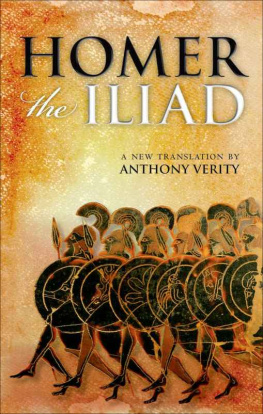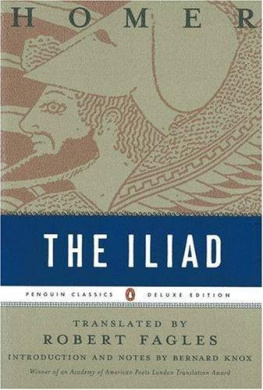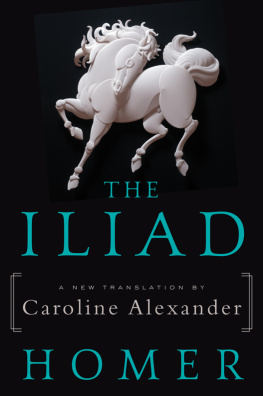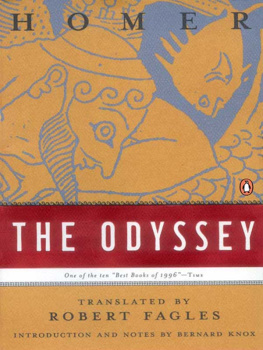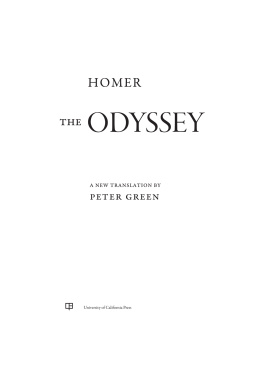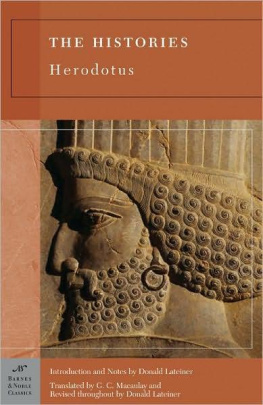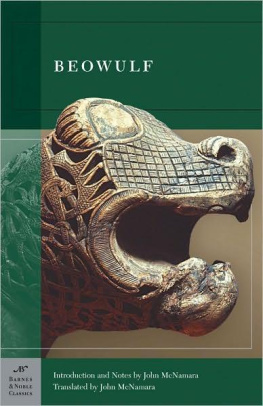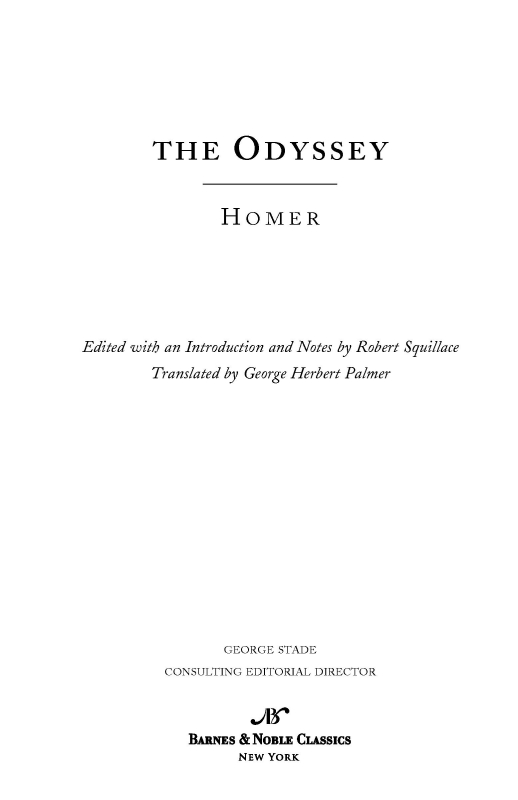
Table of Contents
From the Pages of the Odyssey
Tell of the storm-tossed man, O Muse, who wandered long after he sacked the sacred citadel of Troy. (page 1)
Yet is my heart distressed for wise Odysseus, hapless man, who, long cut off from friends, is meeting hardship upon a sea-encircled island, the navel of the sea. (page 2)
Few sons are like their fathers; most are worse, few better.
(page 18)
Many a grief the son of an absent father meets at home, when other helpers are not by. So with Telemachus; the one is gone, and others there are none in all the land to ward off ill. (page 40)
Athene passed away, off to Olympus, where they say the dwelling of the gods stands fast forever. Never with winds is it disturbed, nor by the rain made wet, nor does the snow come near; but everywhere the upper air spreads cloudless, and a bright radiance plays over all; and there the blessed gods are happy all their days. (page 71)
Better to be the hireling of a stranger, and serve a man of mean estate whose living is but small, than be the ruler over all these dead and gone. (page 142)
Friends, hitherto we have not been untried in danger.
(page 152)
Afterwards a man finds pleasure in his pains, when he has suffered long and wandered long. (page 191)
Half the value of a man far-seeing Zeus destroys when the slaves lot befalls him! (page 215)
Odysseus aimed an arrow and hit him in the throat; right through his tender neck the sharp point passed. He sank down sideways; from his hand the goblet fell when he was hit, and at once from his nose ran a thick stream of human blood. (page 271)
For all humankind immortal ones shall make a joyous song in praise of steadfast Penelope. (page 297)
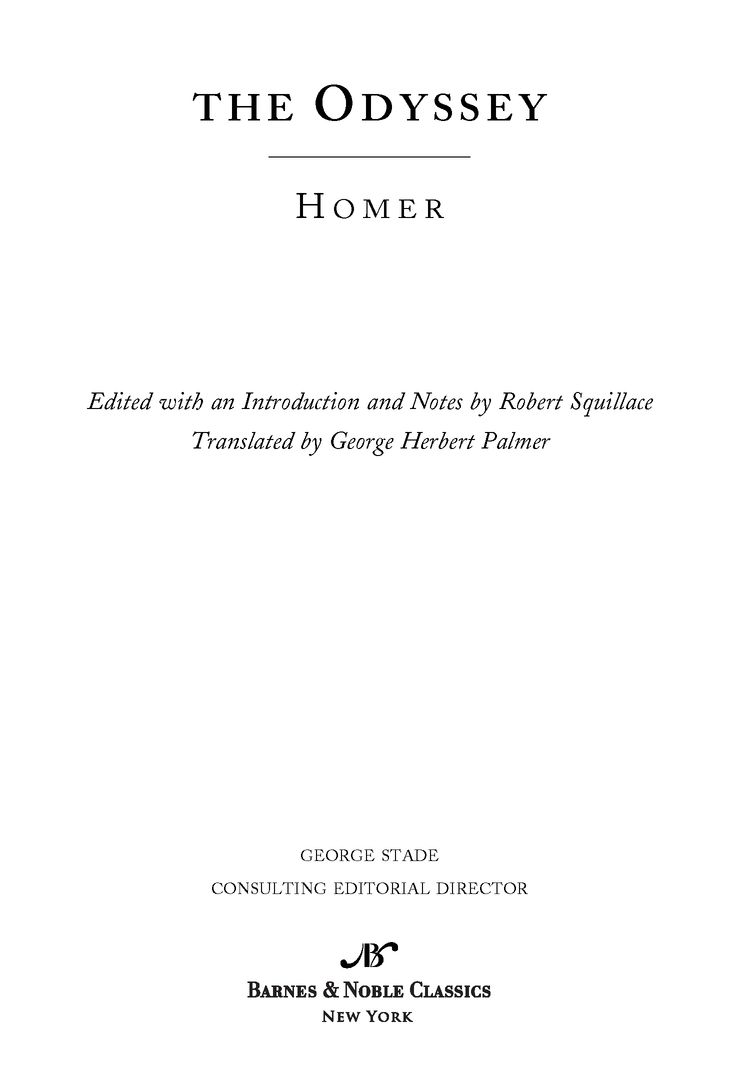
Homer
We know very little about the author of the Odyssey and its companion tale, the Iliad. Most scholars agree that Homer was Greek, most probably from Smyrna, now the Turkish city known as Izmir, or from Chios, an island in the eastern Aegean Sea. According to legend, Homer was blind, and we have no scholarly evidence that suggests otherwise.
The ongoing debate about who Homer was and when, and even if, he wrote the Odyssey and the Iliad is known as the Homeric question. Classicists do agree that these tales of the fall of the city of Troy (Ileum) in the Trojan War (the Iliad) and the aftermath of that ten-year battle (the Odyssey) coincide with the ending of the Mycenaean period (also known as the Bronze Age), around 1200 B.C. The Mycenaeans were a society of warriors and traders; beginning around 1600 B.C., they became a major power in the Mediterranean. Brilliant potters and architects, they also developed a system of writing known as Linear B, based on a syllabary, writing in which each symbol stands for a syllable.
Scholars do not agree on when Homer lived or when he might have written the Odyssey. Some place Homer in the late-Mycenaean period, which means he would have written about the Trojan War as recent history. Close study of the texts reveals aspects of political, material, religious, and military life of the Bronze Age and of the so-called Dark Age, as the period of domination by the less-advanced Dorian invaders who usurped the Mycenaeans is known. But how, other scholars argue, could Homer have created works of such magnitude in the Dark Age, when there was no system of writing? Herodotus, the ancient Greek historian, placed Homer sometime around the ninth century B.C., at the beginning of the Archaic period, in which the Greeks adopted a system of writing from the Phoenicians and widely colonized the Mediterranean. And modern scholarship shows that the most recent details in the poems are datable to the period between 750 and 700 B.C.
No one, however, disputes the fact that the Odyssey, and the Iliad as well, arose from oral tradition. Stock phrases, types of episodes, and repeated phrasessuch as early, rose-fingered dawnbear the mark of epic storytelling. Scholars agree, too, that this tale of the Greek hero Odysseuss journey and adventures as he returned home from Troy to Ithaca is a work of the greatest historical significance and, indeed, one of the foundations of Western literature.
MAP TK
MAP TK
The World of Homer and the Odyssey
| B.C. (approximate dates) |
| 1650-1400 | The Mycenaean period, also known as the Bronze Age because bronze is widely used in weaponry, comes into flower. Pylos and Mycenae, city-states mentioned by Homer in his writings about this pe riod of Greek history, are powerful and wealthy cen ters of Aegean trade. |
| 1200-1100 | The fall of Troy ends the Trojan War, which Homer describes so vividly. Dorians invade, the Myce naean culture declines, and the so-called Dark Age ensues. Linear B, the Mycenaeans system of writing, is lost. The Homeric epics survive as oral legends. |
| 1100-700 | Troy is uninhabited, suggesting that Homers observations of life in the city predate the twelfth century B.C. |
| 800-750 | The Greeks adopt the Phoenician alphabet and set down the Iliad and the Odyssey in writing for the first time. |
| 500-400 | Threatened with a Persian invasion, the Greek city-states turn to Homer as a guide to banding together in the face of a common enemy. |
| 30-19 | The Roman poet Virgil writes the Aeneid, borrowing heavily from Homer. |
| A.D. |
| 450 | With the decline of the Roman Empire, interest in Greek texts and in Homer becomes dormant in the West until learning resurges in the Middle Ages. |
| 600-700 | Homeric figures begin to appear in the Arabic tales of Sindbad. |
| 1870 | Heinrich Schliemann, a retired German businessman with a passion for the Homeric epics, begins excava tions at Troy. |
| 1876 | Schliemann excavates a grave circle at Mycenae and proves that the Mycenaean civilization of which Ho mer wrote indeed existed, inspiring other archaeolo gists to excavate in the region. |
| 1900-1950 | Sir Arthur Evans excavates ancient Knossos, on the island of Crete. Among discoveries relating to the My cenaean culture are clay tablets with Linear B script. The findings help prove that Homers works record historical events in the Mycenaean period. |
| 1920s | Based on observations of contemporary verse compo sition in the Balkans, American scholar Milman Parry determines that the Homeric legends survived for many generations as oral stories. |
INTRODUCTION
The Many Worlds of the Odyssey
The only other book to which the Western imagination owes so much of its stock of heroes, monsters, images, and tales as it does to the Iliad and the Odyssey is the Bible. At the same time, these epic poems attributed to Homer, like the Bible, are not originally Western or even European texts; in fact, even to call them Greek is misleading. Telling the full story behind this apparent contradiction sets the Odyssey firmly in its historical context, clarifying its relation both to its own time and to ours.
Before embarking on this tale, however, one must recognize the three basic layers of the poems creation. First, the setting for the events the Homeric epics describe (to the extent such incidents as the Trojan War ever occurred in the first place) is a wealthy era known as the Mycenaean period. The dominant leaders of the most important city-states on the Greek peninsula, the Mycenaeans were speakers of an early form of Greek who made war with weapons of bronze. This period ended sometime between 1200 and 1100 B.C. Second, the characters, plots, and settings that appear in the epics, however much their origins may belong to the Mycenaean era, continued to develop during a period of oral transmission that spanned the so-called Grecian Dark Age, namely, the centuries from 1100 to 800 B.C. The level of physical culture declined so markedly at this time that most historians believe a separate tribe speaking a different Greek dialect, the Dorians, conquered and sacked all but a few of the Mycenaean city-states. Iron replaced bronze, and the art of writing, known to the Mycenaean world, was lost, leaving the period utterly without written records. Third, the
Next page

